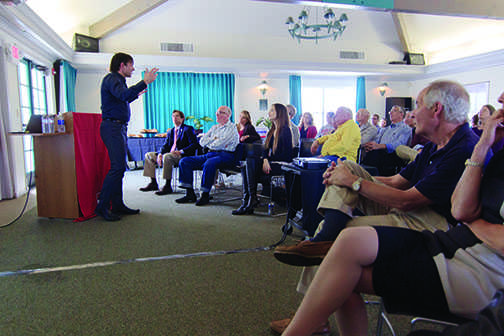Ukraine native Mikhail Alexseev spoke at San Diego State about the Ukraine-Russia conflict on March 27. Alexseev, a political science associate professor at SDSU, lived in the Soviet Union for 27 years before coming to the U.S.
Alexseev was invited to speak at the International Student Center as a part of the International Speaker Series. He spoke about what drove and sustained the protests, why and how protestors prevailed and the future of Ukraine-Russia relations.
The Ukraine-Russian conflict has been building since November when protests began in the capital of Kiev. One of the events that received international coverage is the Russian annexation of the semi-autonomous region of Crimea in March.
Alexseev titled his talk “The Cold War Revisited: Ukraine, Russia and the West.”
“What happened with Crimea changes relations between Russia and the West,” Alexseev said. “There is potential military confrontation, the language is different; it’s very much like the Cold War. It’s about different political systems clashing in the middle of Europe.”
Alexseev said the term “revisited” is optimistic because he hopes the situation will be temporary.
“I think a lot of folks seem to be of the mindset that the world is turning toward this idea of democracy and human rights and so on and I don’t see that happening here,” SDSU european politics lecturer David Fisk said. “That battle is still ongoing in some regions of the world and I think this annexation shows that.”
Alexseev said the annexation of Crimea sets a dangerous precedent for international law.
“It is a dangerous precedent from the point of view of the 1994 Budapest agreement in which the United States and Russia guaranteed Ukrainian sovereignty in exchange for Ukraine giving away nuclear weapons,” he said.
SDSU lecturer and international relations expert Ronald Bee said the Budapest Memorandum protected Ukrainian integrity, borders and prevented economic pressure.
“When they decided to enter into an associate trade agreement with the EU, Putin got upset and put the pressure on,” Bee said. “That’s what started all the protests to begin with.”
Bee said Putin is taking such a heavy-handed stance in the situation out of weakness, not strength.
“He didn’t have the political support at home he needed to remain in power so he needed to rally the Russian flag, wrap himself in the Russian/Soviet flag by creating a, pun intended, red line in Crimea,” Bee said.
Since the annexation of Crimea, Western powers have taken a strong stance against Russia by placing sanctions on Russian officials and businesses.
Director of the International Security and Conflict Resolution department at SDSU Jonathan Graubart said he doesn’t think sanctions against Russia are productive, but are more likely to fuel the situation.
“If the United States could be a part of a global initiative that addressed Russian sensitivities, including the U.S. not living up to promises after the end of the Cold War and not to extend NATO to eastern and central Europe, that would go a long way to then encouraging Russia to comply with international law,” Graubart said.
According to Fisk, if the EU and U.S. keep piling on the sanctions, pocketbook prices will increase.
“If the West decides to keep these sanctions up, prices are going to go up and we’re going to feel it,” Fisk said.
According to Alexseev the ongoing conflict goes beyond just the future of Ukraine-Russia relations – it is about the viability of key international institutions.
“I think it’s important that in the midst of all this everybody keeps an eye on larger values and on sustaining freedom of choice and democratic institutions,” Alexseev said.
Photo by Kevin Serrano, Staff Photographer







